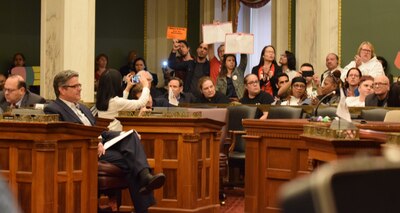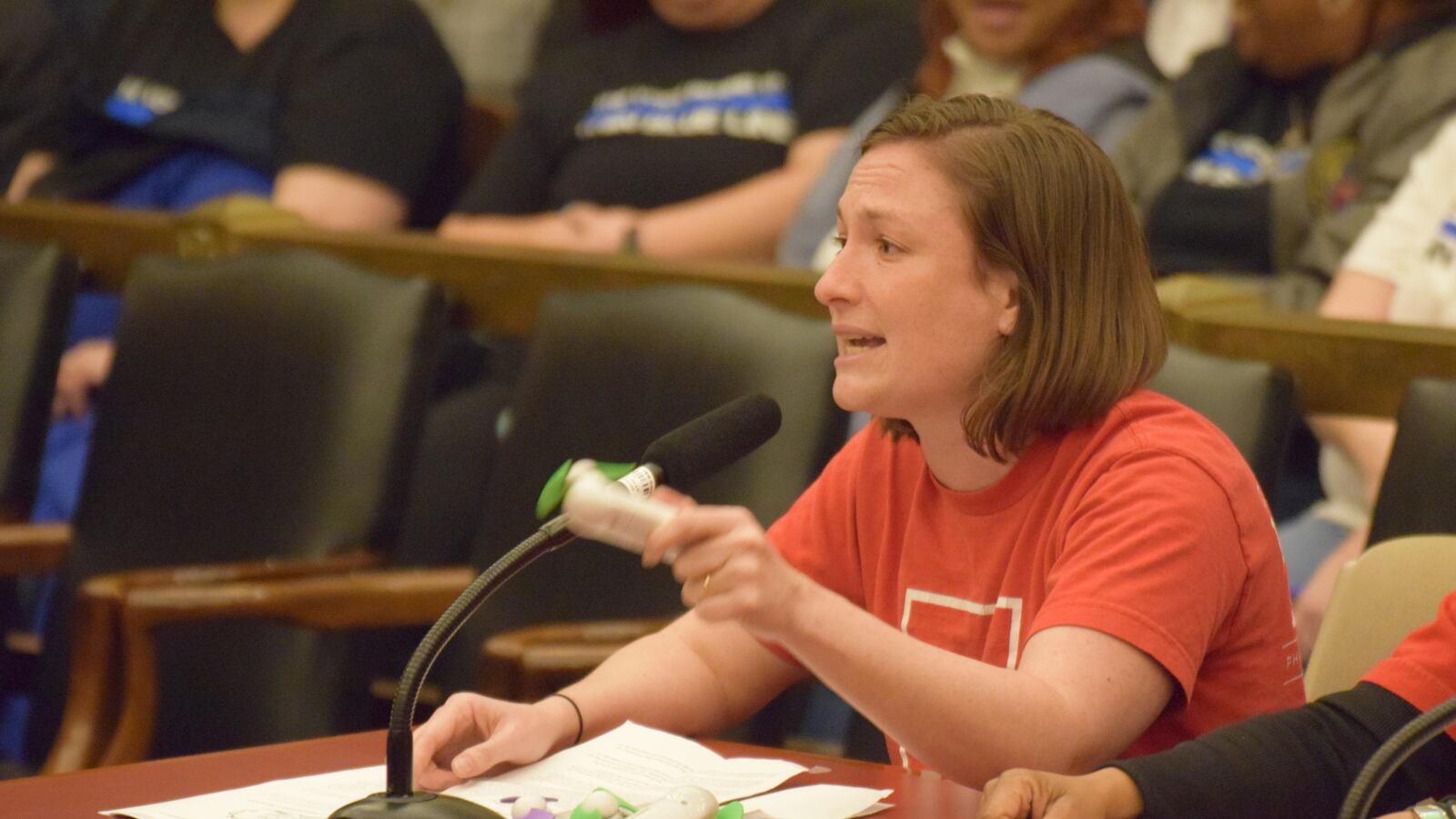This article was originally published in The Notebook. In August 2020, The Notebook became Chalkbeat Philadelphia.
Teachers and parents stormed City Council during budget hearings today to present thousands of petition signatures demanding that the city end the 10-year real estate tax abatement and use the resulting new revenue to fix toxic conditions in the city’s schools. They called for hearings on each of the five bills now before Council that would end or curtail the abatement.
“The 10-year tax abatement has allowed wealthy developers to line their pockets while starving our schools of tax revenue they desperately need,” said Kathleen Melville, a 10th-grade teacher at the Workshop School in West Philadelphia and organizer with the Working Educator caucus. She gave each council member a small fan.
“We would like to invite you to spend a day in one of our classrooms this spring,” Melville told Council in her testimony. “And since we know that you are used to offices that have air conditioning, we are providing you with these necklace fans so that you’ll be ready to join us in one of our many, many classrooms that do not have air conditioning.”
The audience turned out for a variety of issues. The gallery was filled with educators, affordable housing advocates, and police dispatchers. But they all cheered for increasing funding to the city’s schools and many booed the abatement. It exempts $61 million in tax revenue that would go to the city’s schools plus $50 million that would go into the city’s budget.
Melville called the abatement a “racial justice issue,” saying those benefiting from it are largely white, while the city’s public schools mostly serve students of color.
“Although they may never have heard of the 10-year tax abatement, our children see what we value by the money we spend,” Melville said. “When my students walk to school in West Philadelphia, they see that the old West Philadelphia High School is being transformed into luxury apartments. They see the fresh paint, the young trees, the new windows, the clean sidewalks. And when they arrive to school just down the street, they see the stark difference. Leaky ceilings, broken plumbing, and flaking paint.
“This juxtaposition of massive investment in one building and severe neglect in another sends the message that we only invest in school buildings once the children have been cleared out.”
“They see that when white people want fancy condos, we find the money,” she said. “But when it comes to our children, especially our black and brown children, with leaks in their classrooms and lead in their paint and broken toilets and unsafe doors, we can never find the money.
“We want to send a different message to our kids. We want to send them the message that they matter, that they are not alone, and that the adults who care for them will fight for the safe, welcoming schools they deserve.”
Members of the Working Educators caucus within the teachers’ union spent months gathering petition signatures in their schools. The petition, with 3,300 signatures, demands that Council:
- Create a plan to remediate all lead, mold, and asbestos in all schools.
- Create a plan to treat all rodent infestations in all schools.
- Create a plan to overhaul all heating and cooling systems in schools.
- Fund these repairs by ending the 10-year tax abatements.
Organizers with the Our City Our Schools Coalition want public hearings on all the bills, not just a public hearing on whatever bill comes out of a Council committee.
And the hearing was not the only forum where these issues were raised. At a meeting of the Second Ward in South Philadelphia, Academy at Palumbo student Nayeli Perez spoke about the need to fix her beloved school, where the ceiling collapsed last fall, flooding the school, after water built up on the roof.
“Kids in the suburbs don’t have to worry about having access to clean water to keep themselves hydrated in obscenely hot weather,” Perez said. “They sit in air-conditioned rooms. When there’s a rainy weekend, they don’t lose a full day of class because water has flooded three floors of their building, rendering the cafeteria, the library, two stairwells, and several classrooms off limits.
“We have our instructional time stolen from us by things that are out of our control, things that we shouldn’t have to think twice about. And when you look at the demographics of suburban schools and Philadelphia schools, it’s not that hard to recognize why our schools are like this and theirs aren’t.”
Sharon Bryant, a teacher at Cassidy Elementary School, testified before Council, saying “a culture of negligence and depraved indifference continues to put people’s lives in jeopardy.”
Bryant described various health issues and injuries she has experienced since she started working at Cassidy in 2016, though before she started there, she was in “superior health,” playing tennis three times a week with her friends. She’s had issues with her breathing, which could be attributed to the ongoing mold outbreaks caused by leaks. But it could have also been caused by “breathing toxic fumes from welding new radiators during school hours,” she said.
“But I’m here for the children,” Bryant said. “Who among you will stand up and say enough is enough?”
Her final words were drowned in applause and cheers from the packed Council chambers.
Philadelphia librarians also came out to call for more funding, and each librarian in turn expressed solidarity with the city’s schools, where one noted there were only seven full-time librarians, drawing calls of “shame!”
A student intern at the Free Library called on City Council to fix the system, including the schools.
“I am 18 years old. I will be voting in the next election,” she said to cheers from the crowd. “And Mayor Kenney and City Council cannot count on my vote unless they fix the schools and fully fund our libraries!”
Erika Almirón, a longtime immigration and education activist who is now running for a Council seat, spoke in no uncertain terms about ending the abatement.
“We have to stop giving handouts to some of these luxury real estate developers in this city,” Almirón said. “Instead, we must call on those who are benefiting from the tax abatement — the wealthy and politically connected – to join the rest of us and pay their fair share.
“Instead of lining the pockets of supposed condo-kings and wannabe real estate moguls, that money should be going to our children’s education. … Condos should not be built on the backs of students and teachers.”
Janene Hasan, a teacher at Southwark Elementary, spoke about her experience as a teacher, homeowner, and parent. Hasan’s 18-month-old son recently tested positive for lead in his blood. Her classroom was filled with dust and flaking paint while she was pregnant.
“I wonder if I want to subject him to being exposed to more lead by sending him to a Philadelphia public school, even though I’m a passionate believer in public schools,” Hasan said.
She called for an end to the 10-year abatement, something that a few of her Port Richmond neighbors use. Hasan grew up in Philadelphia and said that people in her middle-class, college-educated circles give her strange looks when she mentions that she was born in the city.
She said that most people in her social circles moved here after college.
“They enjoy city life. They get married, buy a nice tax-abated house, have kids, and when those kids are of school age, they flee to the suburbs,” Hasan said. “The people who can afford to live in these tax-abated homes are well above the income of people on my block, including myself.”
One family rarely lives there, because they have homes in two other cities. Another had their house appreciate “several hundred thousand dollars” and they’re selling it to move to the suburbs.
“Meanwhile, so many people who can’t afford it have been pushed out of the neighborhood. So who does the tax abatement benefit?” she asked.
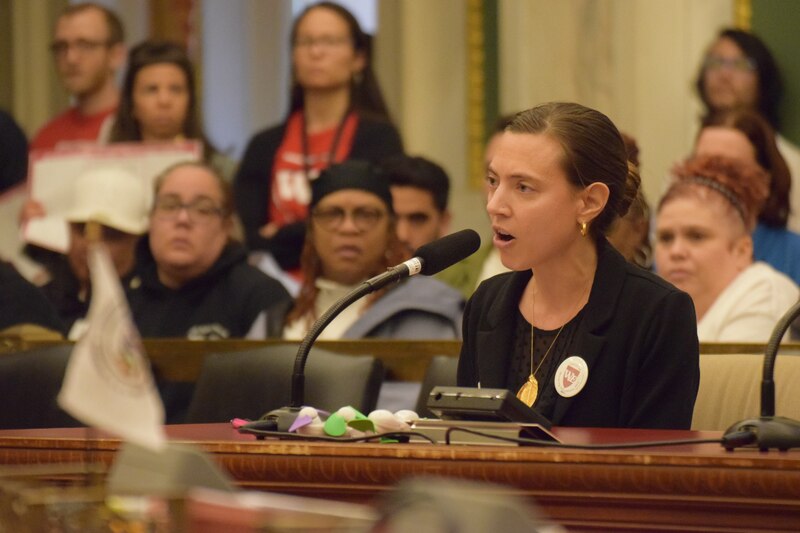
Janene Hasan testifies before City Council about her son’s recent diagnosis of lead in his blood (Photo: Greg Windle)
Jeers from the crowd made it clear how they felt: The tax abatement benefits wealthy individuals and real estate developers, not working people and certainly not the city’s students.
Members of the Philadelphia Coalition for Affordable Communities also support reforming the abatement, calling on the city to invest some of those dollars in affordable housing. However, they say that investment in affordable housing should not be contingent on ending the abatement.
Aiko Razzaq Dorr-Dorynek, who broke his neck at age 18 in a football accident and has used a wheelchair ever since, talked about his difficulties in finding an accessible home.
“The house that my mother and I lived in had 16 steps to get into the front door,” Dorr-Dorynek testified. “That lack of an accessible entry forced me to be incarcerated in a nursing home; there was no other accessible and affordable housing in our neighborhood of my choice, or anywhere in the city that could be found in a timely manner.”
He spent over three years in nursing homes, with one of them functioning like a “maximum security prison,” before he was able to find affordable housing that was accessible. He added that his story is somewhat common because 16 percent of the city’s residents have disabilities.
“Our coalition has worked tirelessly for a permanent and dedicated source of money for the Housing Trust Fund,” Dorr-Dorynek said. “The transfer of money this year is a good step, but is only the first step. This is part of five-year commitment, but the housing crisis will very likely stretch beyond those five years.”
Council has committed $19 million annually, but he urged the members to find a recurring source for $35 million in annual revenue — less than what the city loses every year to the tax abatement, adding that there would still be 55 percent of the abatement left over for the schools.
“We in the coalition are quite aware that the real estate and building industries are among the top donors to members of City Council. Will you rise with low-income Philadelphians and make affordable and accessible housing happen now? Can we count on you?”
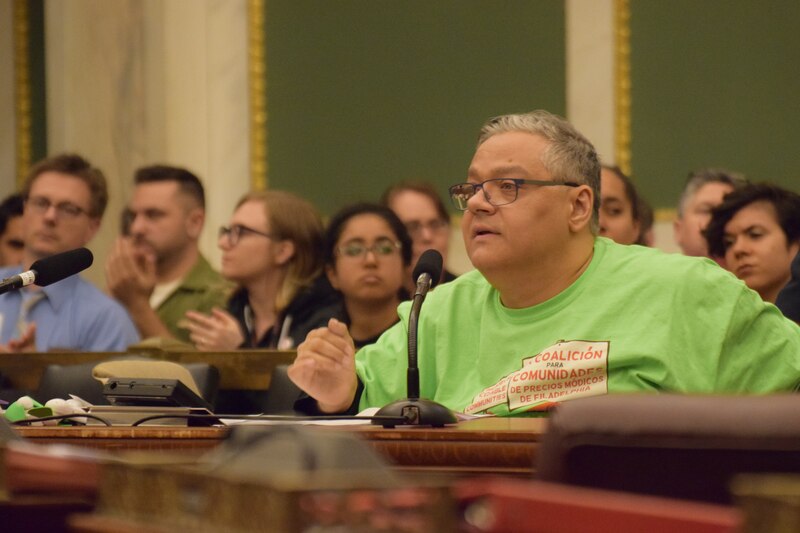
Aiko Razzaq Dorr-Dorynek testifies about his struggles in finding affordable housing that is accessible to those who use a wheelchair, as he does. He called on Council to further boost funding for the Housing Trust Fund (Photo: Greg Windle)
Though none have had hearings, five bills to end or curtail the abatement sit before Council.
Four were introduced by Councilwoman Helen Gym. Two were introduced in May 2018. One would redraw the geographical boundaries for those allowed to receive abatements and base that redrawing on public hearings; the second would eliminate the 55 percent of the abatement that would otherwise be paid to the city’s public schools. Gym’s next two bills were introduced in January. One would gradually eliminate the abatement over 10 years, and the other would cap it at a certain amount of value so it would still allow individual homeowners to receive abatements but would effectively eliminate them for large-scale developers.
Councilwoman Cindy Bass’ bill calls for ending the abatement immediately.
“Philadelphians are mad about the abatement and want something done,” Gym said in a statement. “Folks are mad that this big tax break is going to the rich while our schools face a facilities crisis, and I hear that loud and clear. The city has changed a lot since the abatement began about 20 years ago, and it’s time the abatement changes, too.
“I know that my Council colleagues care deeply about funding our schools and building a fair share taxation system, and I’m looking forward to working with them to get a hearing on these bills and make sure we have fully funded schools and affordable and equitable development.”
Philadelphia Federation of Teachers president Jerry Jordan said that the union supports Gym’s bill to eliminate the portion of the abatement that would otherwise go to public schools. He said the union first supported similar legislation back in 2013, when it was introduced by then-Council member Wilson Goode Jr.
“Education funding is a shared responsibility between the state and the City of Philadelphia,” Jordan said in a statement. “But for too long, Philly’s taxpayers have borne the brunt of the cost of supporting their public schools, while some developers continue to make millions while avoiding paying a fair share. It’s past time to end the 10-year tax abatement.”
Shira Cohen teaches 6th grade at Feltonville School of Arts & Sciences in North Philadelphia and is also an organizer with the Working Educator caucus. She told Council a story about walking into her classroom in August, three days before school was supposed to start, and finding that part of the ceiling had fallen into the room.
“Dust covered everything. Water destroyed hundreds of dollars worth of materials,” Cohen said. “I put a trash can on my radiator to catch the leak. The unit blew hot air – and dust – throughout a room that was supposed to greet new students in under a week.”
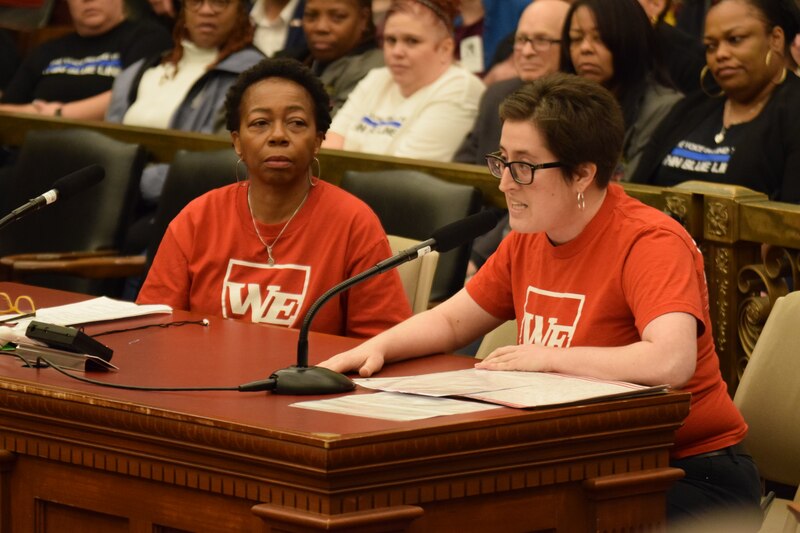
Teacher Shira Cohen (right) demands that Council end the 10-year tax abatement and use the money to remediate toxic conditions in the city’s schools, while Sharon Bryant (left) looks on (Photo: Greg Windle)
But that was just one problem, in just one classroom.
“I have talked to educators who kill several mice a day while they are teaching their students,” Cohen said. “I have talked to workers who teach in their buildings in masks and students whose asthma worsens every year because of the air they breathe.”
Cohen said the petition was carried in person, not online. So the signatures represent thousands of face-to-face conversations and commitments to take actions like the one on display before Council.
“Are you going to meet the demands of our communities who are organizing and every day building more power?” Cohen asked. “You have asked us to be patient, but – I can confirm for you – we are done waiting. Not only are PFT members, parents, and students clear on the schools that our communities deserve, we are fighting and organizing for them.
“We are asking you to end the 10-year tax abatement to fund the work to end our toxic school conditions immediately.”
